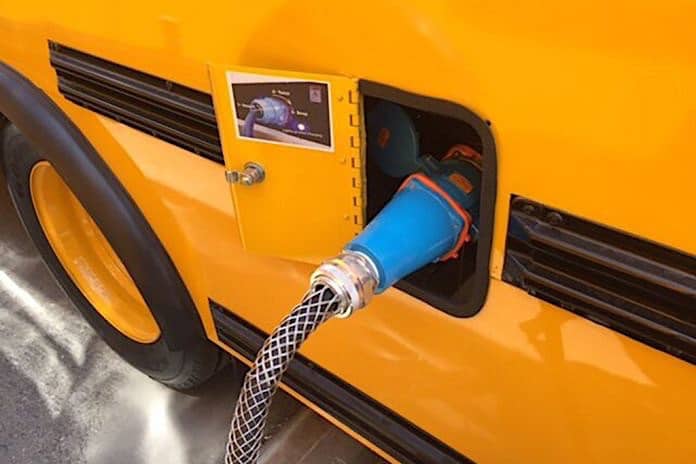President Joe Biden signed the long-awaited bi-partisan $1.2 trillion Infrastructure Investment and Jobs Act (IIJA) that allocates $5 billion in new federal funding over five years for electric and low emission school buses and includes a federal review of school bus stop safety technology.
In an Executive Order on implementation of the new law, Biden stated the IIJA is “once in a generation investment” and will help rebuild America’s roads, bridges and railways. It will also expand access to clean drinking water, ensure access to high-speed Internet across the nation, address the climate crises and environmental justice.
After months of negotiations, the House passed the legislation on Nov. 5, and Biden reportedly waited until Nov. 15 to sign the bill so members of Congress involved in the legislation’s passage could attend a White House ceremony.
As School Transportation News previously reported, IIJA provides $2.5 billion for new “zero-emissions” or electric school buses purchases and $2.5 billion for low-emissions school buses which consist of CNG, propane and biofuels under a new Clean School Bus Program administrated by the U.S. Environmental Protection Agency. The funds will be awarded in $1 billion increments ($500 million each for zero emissions and low emissions) over the next five years.
Related: Infrastructure Funds for School Buses Remain Unchanged in House-Passed Bill
The National School Transportation Association (NSTA) applauded the enactment of the bill, which included the original “Stop for School Buses Act.” The bill calls for a comprehensive federal program for preventing illegal passing of school buses and requires the U.S. Department of Transportation to review illegal passing laws, penalties and levels of enforcement in all 50 states. The DOT will also be looking at technologies such as video cameras, audible warning systems and enhanced lighting as well as driver education material in order to make recommendations on best practices and most effective approaches.
NSTA stated on Monday that while school buses remain the safest form of transportation over all other modes, according to DOT statistics, a pressing problem is motorist failing to yield for stopped school buses. It added that the new program will provide an effective tool for states and local governments to utilize in attempting to prevent illegal passings.
“Riding in a yellow school bus remains the safest mode of transportation to-and-from school for students,” NSTA president Carina Noble said. “Unfortunately, illegal school bus passings by motorists continue to plague the nation, and the comprehensive DOT program to address illegal passing contained in IIJA will implement a national campaign to raise local awareness of this most concerning issue with the shared goal of making student commutes even safer.”
Related: Vaccines For 5 to 11-Year-Olds Could Be Available Early Next Month
Related: New York State Launches Outreach for School Bus Driver Applicants
Related: UMA Launches Campaign for $6 Billion in Additional CERTS Grants
Related: Watch: Homendy Sworn in as NSTB Chair
Related: COVID-19 Funding Relief Finally Coming for Private School Bus, Motorcoach Industries
Meanwhile, the United Motorcoach Association (UMA) stated that the infrastructure law represents a monumental win for the private bus and motorcoach company. IIJA reportedly preserves motorcoach companies’ right to operate without unfair competition from government-subsided transit providers by leaving the Charter Service Rule unchanged, UMA stated.
“The legislation is a sweeping victory for all motorcoach operators,” said new UMA President and CEO Scott Michael. “The law includes a five-year reauthorization of federal highway, transit, motor carrier, and vehicle safety programs. The IIJA contains common-sense safety and regulatory provisions, preserves the motorcoach fuel tax exemption, and includes a new provision to enforce better toll equity with public transit vehicles on toll facilities. Most importantly, the bill avoids expensive and unnecessary mandates on an industry still in recovery mode from the effects of the pandemic.”














